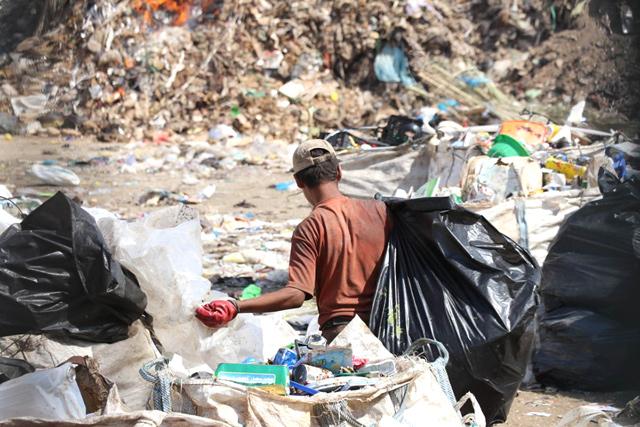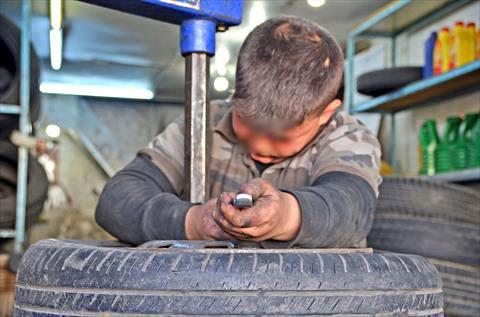You are here
New UNICEF programme tackles child labour
By Maram Kayed - Sep 29,2020 - Last updated at Sep 29,2020

A new UNICEF programme has been launched to ‘end the worst forms of child labour’ in Zarqa and Amman by helping hundreds of children escape from dangerous working environments and return to education and training (Photo courtesy of UNICEF)
AMMAN — A new UNICEF programme has been launched to “end the worst forms of child labour” in Zarqa and Amman by helping hundreds of children escape from dangerous working environments and return to education and training.
The programme will also provide the children’s families with a package of support to “reduce the burden on children to work”, according to a UNICEF statement.
“Child labour is the result of many complex factors, including poverty, social norms, lack of decent work opportunities for adults and adolescents, and emergencies. To effectively address child labour, it’s important to look at the full set of vulnerabilities faced by children and their family to address the root causes and integrate the response across social protection, education, justice and labour market policies,” UNICEF Country Representative Tanya Chapuisat told The Jordan Times.
Trained social workers will identify 400 of the most vulnerable boys and girls of all nationalities aged between 6 and 18 years in Zarqa and Amman to benefit from the programme.
These children, which UNICEF described as having been involved in “the worst forms of child labour”, will receive psychosocial support and help to access to education, life skills, entrepreneurship opportunities and training.
The families of children at-risk of child labour will also be assisted with a package of specialised support, information regarding the negative impacts of child labour, access to livelihoods opportunities and cash assistance.
Chapuisat noted that the programme “aims to support families who are vulnerable to economic shocks, including the negative impact of the COVID-19 pandemic, by offering them viable alternatives that would help lift them out of poverty”.
She added that the trained social workers will “work directly with families and communities to identify, prevent and manage the risks of child labour to tailor a response specific to their needs”.
The programme, implemented by UNICEF partner Rowad Al Khair Society, will bring together the Ministry of Labour, municipalities, local organisations and the private sector to “stamp out the harmful practice of child labour and increase community awareness on its detrimental impact on children and their future”, according to UNICEF.
According to the latest figures from the International Labour Organisation (ILO), 60 per cent of the estimated 70,000 children of all nationalities involved in child labour in Jordan are engaged in hazardous work, noted Chapuisat.
She added that the “worst forms of child labour” include slavery, trafficking, illicit activities and working conditions that harm a child’s health or safety.
“Hazardous work includes working with dangerous machinery, tools or heavy loads, working long hours or during the night, as well as in unhealthy environment such as landfills and recycling plants,” she added.
Ahmad Battat, director of Rowad Al Khair Society, said: “Children engaged in child labour in Zarqa and Amman are our communities’ invisible tragedy, working — often out of sight — in dangerous and hazardous environments such as industrial recycling facilities, vegetable markets and landfills.”
“This new partnership with UNICEF will build the capacity of our social workers to support the most vulnerable children and create a strong local coalition to end this harmful practice for the future wellbeing of our communities,” Battat added.
The programme will also focus on preventive measures by providing relevant education and training programmes that combine vocational, life skills and entrepreneurial training to enhance the employability of young people in these areas.
Quick impact projects will be carried out in remote villages where children are at the greatest risk to improve the quality of services and opportunities for families, reducing their reliance on negative coping mechanisms such as early marriage and child labour, noted UNICEF.
It added that reducing the numbers of children engaged in the worst forms of child labour contributes to Jordan’s efforts to achieve Sustainable Development Goal 8 by 2030.
The cash grants that will be provided to support children and adolescents’ education and training will be monitored, noted Chapuisat.
“Child labour robs children of their childhood. It deprives them of their rights, exposes them to violence and physical and mental harm and traps them in intergenerational cycles of poverty.
“This new programme will help children escape the nightmare of child labour and provide much-needed support to vulnerable families who are facing even greater economic shocks as a result of the COVID-19 pandemic,” she added.
Related Articles
AMMAN — Child labour has become a serious issue in Jordan, especially during the pandemic, according to officials.The National Child Labour
GHOR AL MAZRAA, Karak — UNICEF Jordan and its implementing partner, Rowad Al Khair, this week are leading the “Caravan of Joy” to brin
AMMAN — Secretary General of the Ministry of Social Development Barq Al Dmour and Director of Social Development in Maan Amjad Al Jazi on Tu

















